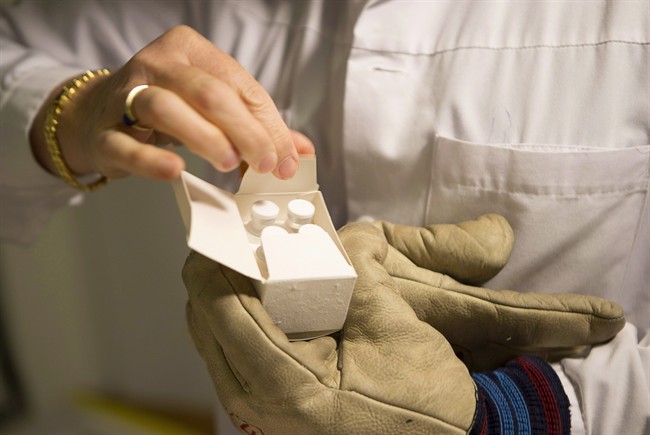TORONTO – Clinical trials designed to show whether two Ebola vaccines and the Ebola therapy ZMapp actually work will begin within the next two to three weeks, American officials designing the studies said Thursday.

But falling case counts in the three West African countries where the outbreak has raged are forcing some modification of the vaccine trial designs — and potentially lowering expectations of what they will be able to achieve, the officials acknowledged.
The largest of the planned vaccine trials — expected to begin within the next two weeks in Liberia — may be expanded into Sierra Leone, said Dr. Anthony Fauci, director of the U.S. National Institute of Allergy and Infectious Diseases.
READ MORE: Ebola is mutating, experimental drugs may not work
Fauci, whose agency will run this trial in conjunction with the Liberian government, said the change would have to be approved by the governments of Liberia and Sierra Leone. But he said representatives of the two countries proposed the idea at a recent planning meeting.
With the marked decline in new cases, it could take between nine and 12 months to run this trial, Fauci said. And he acknowledged there is a possibility it will not show whether one or both Ebola vaccines to be tested actually work.
Still, data that the trial generates could be used to get one or both vaccines licensed through a different regulatory approach known as the animal rule. Some of the 27,000 people to be enrolled will give blood samples which scientists will be able to study to see if the vaccines triggered production of antibodies to Ebola.
READ MORE: How does Ebola spread? 5 things you need to know

Get weekly health news
In special circumstances where it isn’t possible to test vaccines or drugs in the standard way, the U.S. Food and Drug Administration has a rule that allows effectiveness data generated in two different animal models to be used as a stand-in for data in humans. But that could be a longer and more difficult road to licensure for the vaccines.
“You could carry out the trial, not prove efficacy, but get enough safety and immunogenicity data to allow for an alternative regulatory approval such as by the animal rule,” Fauci said.
The Liberian trial will test the two most advanced Ebola vaccines, one made by British pharma giant GSK, the other by NewLink Genetics and Merck. The GSK vaccine was designed by scientists at the National Institute of Allergy and Infectious Diseases while the NewLink-Merck vaccine was created by researchers at Canada’s National Microbiology Laboratory in Winnipeg.
Healthy volunteers will be randomly assigned to receive one of the vaccines or a placebo injection.
READ MORE: 5 things to know about Canada’s experimental Ebola vaccine
If one or both of the vaccines is protective, you would expect to see far fewer infections in the weeks and months after vaccination in people who received one of the vaccines.
But if Ebola transmission in Liberia sinks to very low levels, it may be impossible to tell if the vaccines work. If no one is getting sick, you have no proof the vaccines are protective.
Data released Wednesday by the World Health Organization showed that in the 21 days prior to Jan. 18 there were only 25 confirmed, probable or suspected Ebola cases in Liberia.
READ MORE: What you need to know about Canada’s contribution to Ebola vaccines
It is conceivable that there might be an answer sooner to the question of whether ZMapp works.
The treatment is a hybrid of two antibody cocktails produced by teams in Winnipeg and at the National Institute of Allergy and Infectious Diseases. The Winnipeg lab did the work to determine the optimal mix of antibodies, eventually hitting on two created in Winnipeg and one made at the NIAID.
A number of people have been treated with ZMapp since last summer, and several have made rapid recoveries. But treatment was not used in a clinical trial setting, so it’s impossible to credit the antibody cocktail with those recoveries.
The ZMapp clinical trial, which will take place in Liberia and the United States — if the country has more cases — will randomly assign people diagnosed with Ebola to receive standard care, or standard care plus ZMapp.
READ MORE: Worried about Ebola? 5 answers to your questions
Fauci said that the statistical projections suggest that it could take as few as 12 patients — or as many as 40 — to determine if the treatment is effective.
FDA approval of this trial is expected soon and the trial will start in two or three weeks after that, he said.







Comments